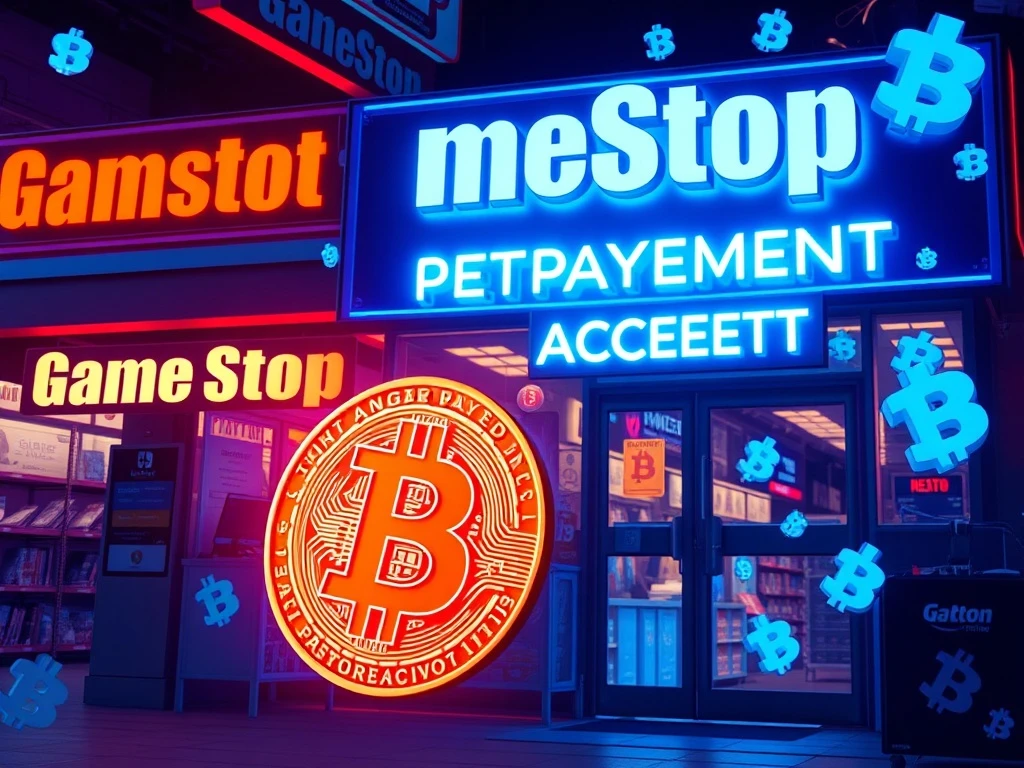GameStop Crypto Unveils Bold Strategy: Bitcoin as a Powerful Inflation Shield

GameStop, the iconic video game retailer, is once again making headlines, not just for its unique position in the stock market, but for a bold leap into the world of digital assets. CEO Ryan Cohen recently teased the potential for GameStop Crypto payments and unveiled a significant Bitcoin investment, positioning it as a strategic move against inflation. This pivot signals a new chapter for the company and highlights a growing trend of corporate adoption within the cryptocurrency space.
GameStop Crypto: A New Horizon for Retail?
During a recent interview on CNBC’s Squawk Box, GameStop CEO Ryan Cohen hinted at an exciting possibility: the integration of crypto payments for trading card purchases. This move comes as GameStop shifts its focus, reducing reliance on hardware sales due to rising costs and emphasizing collectibles. Cohen stated, “There’s an opportunity to buy trading cards and to do so using cryptocurrency. So, we’ll see how much there is on the actual demand side for that kind of product.”
GameStop’s exploration of crypto payments extends beyond just trading cards. Cohen emphasized the utility of crypto beyond traditional investing, noting, “The utility of crypto beyond investing is a hedge against inflation. I think so far that’s been the biggest demand for crypto, and so, the ability to actually use crypto within transactions is something that is an opportunity and it’s something that we’re looking at.” The company is not limiting its options, with Cohen confirming they are looking at “all cryptocurrencies” for potential integration. This broad approach suggests a comprehensive strategy to embrace digital currencies, rather than focusing on a single token.
Why is Bitcoin an Inflation Hedge for GameStop?
A significant revelation from Cohen was GameStop’s substantial investment in Bitcoin. On May 28, the company acquired 4,710 BTC, a purchase valued at over $500 million at the time. Cohen explicitly stated that GameStop’s Bitcoin Inflation Hedge was a strategic decision to “hedge against inflation and global money printing.”
This move sets GameStop apart, with Cohen keen to differentiate their strategy from that of MicroStrategy, a company well-known for its large Bitcoin holdings. “We have our own unique strategy, and we have a very strong balance sheet of over $9 billion in cash and marketable securities, and we will deploy that capital responsibly as I would my own capital,” he explained. GameStop’s approach is to “look for opportunities where the downside side is limited and there’s a lot of upside,” indicating a calculated risk-reward philosophy behind their Bitcoin acquisition.
Ryan Cohen’s Strategic Vision and Past Crypto Ventures
The latest announcements are part of a broader strategic transformation led by Ryan Cohen. His vision for GameStop involves diversifying revenue streams and adapting to evolving consumer behaviors. The shift towards collectibles and digital opportunities is central to this strategy. However, GameStop’s journey into the crypto space is not without its past challenges.
The company previously ventured into the non-fungible token (NFT) market with an NFT marketplace, which was eventually shut down in January 2024 due to concerns about regulatory uncertainty. Similarly, a crypto wallet launched by GameStop was also shuttered in November 2023, citing similar regulatory concerns. These past experiences highlight the complex regulatory landscape that companies must navigate when integrating blockchain and cryptocurrency technologies. GameStop’s current cautious yet ambitious approach suggests they are learning from these past hurdles while still pursuing innovation.
The Promise and Pitfalls of Crypto Payments Integration
The prospect of Crypto Payments at GameStop opens up a realm of possibilities for both the company and its customers. For consumers, paying with cryptocurrency could offer faster transactions, potentially lower fees compared to traditional payment methods, and enhanced privacy. For GameStop, accepting crypto could attract a new demographic of tech-savvy customers, enhance brand image as an innovator, and potentially reduce payment processing costs in the long run.
However, the path to widespread crypto payment adoption is fraught with challenges. Volatility remains a significant concern, as the value of cryptocurrencies can fluctuate dramatically, impacting both the merchant and the consumer. Regulatory clarity is another major hurdle, as evidenced by GameStop’s previous closures of its crypto ventures. Integrating crypto payment systems also requires robust technical infrastructure, security measures, and staff training. GameStop’s careful evaluation of “demand side” and “all cryptocurrencies” indicates a methodical approach to mitigating these risks.
GameStop Bitcoin’s Market Impact and Future Outlook
While GameStop’s Bitcoin investment and crypto payment tease represent significant news in the crypto world, the stock market’s immediate reaction to the GameStop Bitcoin news was somewhat subdued. GameStop (GME) shares saw an 18% jump in February amid speculation of alternative asset investments, but at the close of trading on Tuesday following Cohen’s comments, GME shares were down over 2%, with only a marginal bump after hours. This mixed reaction suggests that while the crypto community might be excited, traditional investors are still processing the long-term implications of GameStop’s crypto strategy.
GameStop’s financial position remains strong, with over $9 billion in cash and marketable securities. The company recently disclosed it had raised another $450 million as part of a planned $2.25 billion private convertible note offering, with these funds potentially allocated for further investments, including Bitcoin. This robust financial backing provides GameStop with the flexibility to continue exploring and investing in new opportunities, including expanding its presence in the digital asset space.
A New Era for GameStop and Crypto Adoption
GameStop’s latest strategic moves, spearheaded by Ryan Cohen, underscore a fascinating convergence of traditional retail and the burgeoning world of digital assets. By teasing crypto payments and making a substantial Bitcoin investment as an inflation hedge, GameStop is not just adapting to market trends; it’s actively shaping its future. While challenges like regulatory uncertainty and market volatility persist, GameStop’s strong balance sheet and measured approach position it as a key player to watch in the ongoing story of mainstream crypto adoption. This bold pivot could redefine GameStop’s identity and inspire other traditional businesses to explore the transformative potential of cryptocurrencies.









